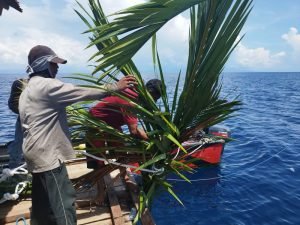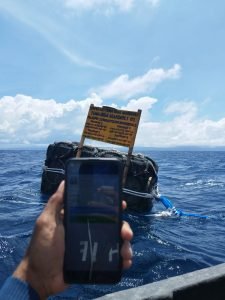Fish Aggregating Devices (FADs) have commonly been placed out at sea by fishers as tools to help them catch fish. These devices attract fish, making it easier for fishers to find and catch them. However, if installed haphazardly, FADs can hinder rather than support fishing efforts.
In Bisa Island, North Maluku Province, fishers have expressed that they have faced challenges finding fish in the area over the past year. This decline in catch decline can be attributed to the excessive number of FADs installed in the area disrupting their fishing activities.
Sarno La Jiwa, a small-scale tuna fisher, highlighted the struggled caused by numerous FADs obstructing fishing grounds and impeding their fishing activities. The competition with large-scale fishers who have the advantage of operating larger vessels accumulating bigger catch volumes also adds to the challenges of Sarno and his fellow small-scale fishers. “There was a time when we couldn’t go fishing for five months because there was no fish,” Sarno recalled.
Driven by their loss of income, Sarno and fellow fishers decided to voice their concerns. They approached the North Maluku Department of Marine and Fisheries (DKP) and the Regional Legislative Council (DPRD) in early 2022, seeking government intervention to regulate the proliferation of FADs.
The FADs around Bisa Island were considered unregulated since they had been installed without permits. This prompted the government to tighten FAD regulations after issuing Ministerial Regulation no. 18 of 2021 (Permen KP no. 18 tahun 2021). To ensure responsible and sustainable fishing, stakeholders looking to deploy FADs at sea must now obtain a FAD Installation Permit (Surat Izin Pemasangan Rumpon or SIPR).

Fishers in Bisa Island setting coconut leaves to attract fish. Coconut leaves swayed by the underwater currents can attract tuna to swim around them.
Fishers’ navigating the permit process
Despite the increased concerns over illegal FADs, Sarno and his Fisher Association recognized their own responsibility. Initially, the FAD that had been helping them catch fish had been installed without a permit. However, having experienced the consequences of unregulated FAD use, Sarno and fellow Bisa Island fishers embarked on a quest to obtain the proper permits for their FAD. In addition to helping fishers find catch, the legality of FADs aligns with their commitment to the principles of the Fair Trade USA certification, maintained by the Fisher Association since 2018.
With limited resources, Sarno then sought MDPI’s assistance to help his group acquire a FAD Installation Permit (SIPR). MDPI, having previously supported Sarno’s Fisher Association in obtaining the Fair Trade USA certification, recognized the significance of their intentions to further practice responsible fisheries.
In mid-2022, MDPI assisted the fishers through the online registration system, taking into account the fishers’ limited digital literacy.
“Throughout the FAD permit process, we helped them create an OSS account and compile necessary requirements,” said Putra Satria Timur, MDPI’s Fisheries Lead. The requirements included various data, such as FAD design, marine and socio-economic data, which proved challenging for Bisa Island fishers to gather. The SIPR for Bisa Island fishers was ultimately issued on December 20, 2022.
Positive impacts experienced by fishers

The fish aggregating device owned by the Tuna Bisa Mandioli Fishermen Cooperative is licensed and registered in the system.
Fishers have reported tuna’s catch raising once again, following the steps taken to regulate FADs. With their FAD being legal, they have resumed their fishing activities. “The fishing conditions have improved now that FAD placements are regulated. Fish are easier to catch,” explained Sarno.
Sarno also highlighted that the proper regulation of FADs has provided a sense of security for his group. The legal FAD owned by the Tuna Bisa Mandioli Cooperative is now safe from confiscation by local authorities. The FAD permit also facilitates the implementation of their Fair Trade USA certification activities.
Looking ahead, small-scale fishers from Bisa Island are aiming to acquire more FAD permits to ensure responsible fishing, aligned with government regulations. Sarno’s group efforts have also influences other Fisher Associations who intend to pursue proper registration. “We share information with other small-scale handline and huhate fishers to ensure we can all adhere with government regulations,” Sarno concluded exemplifying a united commitment to sustainable and responsible fishing practices.
